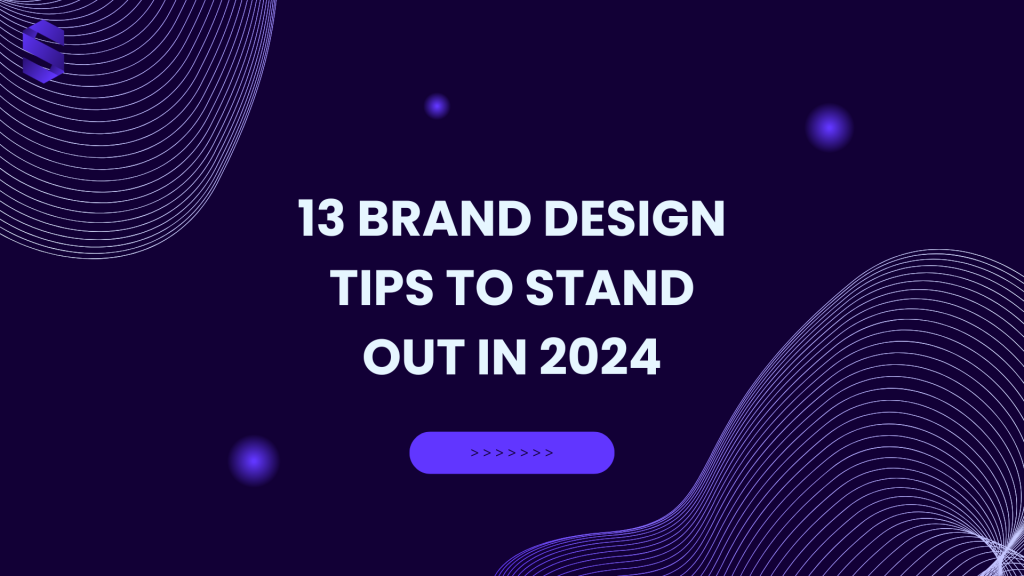Your brand identity is key in today’s market. It’s not just a name or logo anymore. It must show your company’s mission, values, and personality. Creating a unique brand identity is tough but vital for success.
Did you know 41% of people want businesses to talk more about social issues? This number goes up to 61% for Black and Asian consumers. Your brand design must show your values and connect with your audience.
Your visual branding is crucial for grabbing customer interest. Think of brands like IKEA, Apple, and Porsche. Their short names and unique logos make them stand out. Nike’s “Just do it” slogan is another example of a memorable brand element.
Ready to improve your brand design? We have 13 tips for 2024. From defining your unique selling proposition to creating a timeless logo, we’ve got it all. Let’s make your brand unforgettable!
Key Takeaways
- Brand identity goes beyond just a name or logo
- Your brand should reflect your company’s values and mission
- Visual elements like colors and fonts are crucial for brand recognition
- A unique value proposition sets you apart from competitors
- Adapting your brand design for various platforms is essential
- Consumer expectations for brand social responsibility are increasing
- Memorable brand elements contribute significantly to marketing success
Understand Your Brand’s Core Values
Your brand’s core values are the foundation of your identity. They guide your decisions and shape how customers see you. In fact, 77% of consumers choose brands that align with their values. Let’s dive into creating brand identity guidelines that truly reflect your company’s essence.
Define Your Mission Statement
A clear mission statement sets the tone for your brand. It’s not just a catchy phrase; it’s your purpose in words. Think about what drives your company and why you exist. Your mission should inspire both your team and your customers.
Identify Your Unique Selling Proposition
What makes you stand out? Your unique selling proposition (USP) is key to differentiating yourself in a crowded market. It could be your innovative technology, exceptional customer service, or a groundbreaking product feature. Highlight what sets you apart and make it a central part of your brand voice and tone.
Struggling to craft a brand identity that truly stands out? At Startup Content, we help businesses define their unique voice and create compelling messaging that connects with their audience. Let’s refine your brand today! Talk to us now.
Develop a Brand Personality
Give your brand human-like traits that resonate with your target audience. Are you friendly and approachable? Professional and authoritative? Innovative and cutting-edge? Your brand personality should shine through in all your communications, from your website copy to your social media posts.
Remember, consistency is key. Your core values should be evident in every aspect of your brand. By aligning your actions with your stated values, you’ll build trust and create a strong, memorable brand identity that stands out in 2024 and beyond.
Research Your Target Audience
Knowing who you’re talking to is key for a strong brand. Target audience analysis helps you make your brand speak to the right people. Let’s see how to do this well.
Create Audience Personas
Making detailed audience personas is a big step. These are like fake people that show who you want to reach. Think about:
- Demographics (age, gender, location)
- Psychographics (interests, values, lifestyle)
- Buying habits and preferences
- Pain points and challenges
With these personas, you can design for real people. This makes your brand feel more real and interesting to your audience.
Analyze Competitor Strategies
Looking at what your competitors do can teach you a lot. Check out their:
- Visual elements (colors, typography, imagery)
- Messaging and tone of voice
- Target audience segments
- Unique selling propositions
This helps you find what’s missing and how to stand out.
| Audience Research Method | Benefits | Challenges |
|---|---|---|
| Surveys | Direct feedback from target audience | Low response rates |
| Social Media Analytics | Real-time audience insights | Data overload |
| Focus Groups | In-depth discussions | Small sample size |
Good brand design comes from knowing your audience well. By doing your research, you’ll make a brand that really speaks to people and helps your business grow.
Prioritize Consistency Across Platforms
Being consistent is important in 2024. Your look should be the same everywhere. This makes people recognize and trust your brand more.
Use a Uniform Color Palette
A consistent color scheme is key for brand recognition. Choose colors that show your brand’s personality. Use them everywhere, like on your website and social media.
Establish Brand Guidelines
Make detailed brand style guides for consistency. These guides should cover logos, fonts, and more. They help your team keep your look the same.
| Element | Guideline | Impact |
|---|---|---|
| Color Palette | Define primary and secondary colors | 10-20% revenue increase |
| Typography | Specify font families and sizes | Improved readability |
| Logo Usage | Outline placement and size rules | Enhanced brand recognition |
Consistency is not just about looks. Your brand’s voice and message should match everywhere. This can make your sales go up by 10-20%.
By focusing on consistency, you’re not just making a visual identity. You’re creating a strong, trusted brand. This is key to standing out in 2024’s busy market.
Focus on Typography
Typography shapes your brand’s look. The right font can make or break your design. Let’s explore how to pick fonts that connect with your audience.
Choose Readable Fonts
Readability is key. You want your message to be clear and easy to read. Sans-serif fonts like Arial or Helvetica are good for digital platforms.
They look modern and clean. This is perfect for tech companies and startups that want to show they’re innovative.
Limit Font Families
Use only 2-3 font families. This keeps your look consistent. Consistent branding helps keep customers coming back.
Ensure Contrast for Accessibility
Good contrast makes your text easy for everyone to read. It’s not just about looks; it’s about being inclusive. Proper contrast can make your design stand out.
The first digital typeface was made in 1968. Since then, typography has grown a lot. Today, websites like WhatFontIs have over a million fonts. That’s a lot of choices for your brand!
| Font Type | Perception | Best For |
|---|---|---|
| Serif | Traditional, Trustworthy | Law, Finance |
| Sans-serif | Modern, Clean | Tech, Startups |
| Script | Elegant, Creative | Luxury, Fashion |
| Display | Bold, Unique | Attention-grabbing Headlines |
Choose fonts that match your brand’s personality. Whether you want classic elegance or modern edge, your typography should show it. The right font can make people feel something and build your brand’s value.
Leverage Graphic Elements
Graphic elements are key for visual branding. They make complex ideas simple and make your brand stick in people’s minds. Icons, illustrations, and visual order help your brand talk better and focus attention.
Use Icons and Illustrations
Custom graphics make your brand unique. They add a personal touch and make info easy to get. Use icons for main features or services. Illustrations share your brand’s story, creating a bond with your audience.
Incorporate Visual Hierarchies
Visual hierarchies help viewers follow your content. They make info clear and easier to remember. Use size, color, and where things are placed to make your designs clear. This makes your visual branding work better.
Visual hierarchies are like a roadmap for your audience’s eyes, guiding them through your brand’s story with purpose and clarity.
Your graphic elements should match your brand’s look. Being consistent is crucial for a strong visual identity. It helps your audience connect with your brand and gets them inspired by your logo.
| Graphic Element | Purpose | Impact on Brand Recognition |
|---|---|---|
| Icons | Simplify complex ideas | Increases by 80% |
| Illustrations | Tell brand story | Boosts emotional connection |
| Visual Hierarchies | Guide attention | Improves information retention |
Embrace Modern Design Trends
Keeping up with packaging design trends is key for brands. In 2024, new design trends are changing how companies look. Here are some tips to help you shine in a busy market.
Stay Updated on Color Trends
Colors can really make your brand pop. Bright and bold colors are popular, making your brand feel strong and confident. Soft pastels are also in, for a gentler look. Today’s color trends mix bold colors with simple designs.
Utilize Minimalism in Your Design
Minimalism is big in design, offering a clean look. It uses simple shapes and lines to share your brand’s message clearly. Brands like Apple show how minimalism can make a brand look modern and sleek.
But, some brands are going for maximalism for a bold look. This style is great for Gen Z, who love bright and fun designs.
“Design is not just what it looks like and feels like. Design is how it works.” – Steve Jobs
Here’s a quick look at minimalist and maximalist designs:
| Design Approach | Key Features | Best For |
|---|---|---|
| Minimalism | Clean lines, ample white space, limited color palette | Tech, luxury, and professional services brands |
| Maximalism | Bold colors, intricate patterns, diverse elements | Fashion, entertainment, and youth-oriented brands |
Understanding your audience is key to good brand design. Pick trends that fit your brand’s vibe and values. By knowing the latest trends and using these tips, you’ll make your brand stand out in 2024.
Create a Memorable Logo
A striking logo is at the heart of your brand. It’s often the first thing people see. To make a logo that stands out, you need to find inspiration. Let’s look at how to create a logo that truly impresses.
Consider Different Logo Styles
There’s no single way to design a logo. You can choose from many styles:
- Wordmarks: Your company name in a unique font
- Lettermarks: Initials or acronyms of your business
- Symbols: Iconic symbols of your brand
- Abstract marks: Designs that don’t represent anything
- Combination marks: Text and symbols together
Each style has its own benefits. For example, Pepsi’s logo has changed over 120+. It shows how a combination mark can evolve while keeping brand identity.
Ensure Scalability and Versatility
Your logo must look good everywhere – from small app icons to big billboards. Vector graphics are essential. They let your logo grow without losing quality. Keep it simple. Simple designs are easier to remember.
Color is also very important in logo design. Did you know 85% of consumers choose products based on color? Pick colors that show your brand’s personality and stand out in your field. The right colors can make your brand 80% more recognizable.
Finally, test your logo in different situations. It should look good on various backgrounds, in color and black-and-white. This makes sure your brand looks strong in all marketing materials.
Optimize for Digital and Print
In today’s world, your brand needs to shine in both digital and print. It’s important to look good on all platforms to reach more people.
Adapt Designs for Social Media
Social media needs special designs. Each site has its own size rules and what people expect. Make designs that are flexible and keep your brand’s look.
- Use eye-catching visuals that stop users mid-scroll
- Incorporate interactive elements like polls or quizzes
- Design shareable content to increase organic reach
- Optimize images for mobile viewing
Ensure High-Quality Print Materials
Print materials feel real and digital can’t. High-quality print design shows your brand is serious and makes a strong impression.
When making print materials, remember these things:
| Print Design Element | Recommended Specification |
|---|---|
| Resolution | Minimum 300 dpi |
| Color Mode | CMYK |
| File Formats | PDF, EPS, TIFF, PNG |
| Bleed | 0.125 inches (3 mm) on each side |
By making designs for both digital and print, you make your brand stronger. This way, more people will know and care about your brand.
“Combining digital and print marketing can lead to an exponential growth, such as two plus two equaling ten.”
Remember, consistency is key. Your brand should look the same everywhere. By being good at both digital and print, you’ll make your brand strong and connect with more people.
Gather Feedback and Iterate
Creating a great brand design is not done once. It needs constant improvement based on what your audience says. To make a brand that really connects, you must ask for feedback and change your designs often.
Conduct Surveys and Focus Groups
Begin by doing surveys and focus groups to learn what people think. These can give you both numbers and stories about how your brand works. Remember, getting feedback is key to learning and making your designs better.
Test Design Concepts with Real Users
Try out your designs with real people. This shows what works and what doesn’t in your brand’s look and message. What people say can tell you if your brand meets their needs. Also, getting feedback from your team can make everyone work better together.
The design process that keeps improving is fast and smart. It leads to designs that are new and care about people. By doing things in small steps, you can make your brand design faster and cheaper.
Your brand deserves a powerful identity. From messaging to content strategy, Startup Content ensures your brand’s voice is consistent, engaging, and optimized for growth. Let’s bring your brand to life! Get started now.
FAQ
What are the key components of a strong brand identity?
A strong brand identity has your company’s mission, vision, and values. It also includes your voice, personality, and visual elements. It’s more than just a name or logo. It’s the whole package that shows who you are to the world.
How can I develop a unique brand personality?
To create a unique brand personality, pick traits that your audience likes. This could be friendliness, professionalism, or innovation. These traits should match your company’s values and mission. This helps your brand stand out from others.
Why is consistency important in branding?
Being consistent in branding makes your brand more recognizable and trustworthy. It means using the same colors, messaging tone, and following brand guidelines everywhere. This builds a strong brand image.
How does typography affect brand identity?
Typography is key in showing your brand’s personality and making designs look better. Choose fonts that are easy to read. Stick to 2-3 fonts to keep things consistent.
What role do graphic elements play in brand communication?
Graphic elements like icons and illustrations make your brand more memorable. They help share complex ideas simply. They should match your brand’s look and message, guiding the viewer’s attention.
How can I stay current with design trends in branding?
Keep up with color trends like colorful minimalism and candy-colored pastels. You can go for minimalist design for a sophisticated look or maximalism for something bold. Always check out new trends and see how they fit your brand.
What makes a logo memorable?
A memorable logo shows your brand’s personality. It should look good in different sizes and formats. Choose a style that works well everywhere, from small to large sizes.
How can I optimize my brand design for both digital and print?
Make your designs work for social media and print. Use high-quality materials for print to keep your brand looking good. This way, your brand looks consistent everywhere.
Why is gathering feedback important in brand design?
Feedback from surveys, focus groups, and user testing is very valuable. It helps you see how people see your brand. This feedback loop helps make your brand design better, keeping it relevant and appealing to your audience.
How can I create effective brand color palettes?
To make good brand color palettes, pick colors that show your brand’s personality. Think about color psychology and make sure colors contrast well for everyone. Test your colors on different platforms to keep things consistent.








